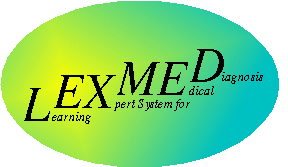Auf einen Blick

LEXMED developed under the guidance of Prof. Ertel at the University of Applied Sciences of Ravensburg-Weingarten is a medical diagnostic system which is capable of learning. It is easy to handle and provides the doctor on the basis of the patient’s symptoms a well-founded diagnoses for the existence of appendicitis. It is based on software for developing knowledge-based systems which specially suit for handling uncertain and incomplete knowledge.
Contrary to wide-spread opinion diagnosis off appendicitis is not easy. Surgeons “know that the clinical diagnosis of appendicitis is difficult and burdened with uncertainty” and “that on the other hand the omission of an operation if there is an acute inflammation means a considerable high risk, which is why the, in a sense, immanent frequency of misdiagnosis (in the form of unnecessary operations) is about 15%.” (see literature: B. Hontschik, 1994; cf. Böhner et al. 1994). At the same time, appendicitis is a common illness (about 10,000 cases only in Baden-Wuerttemberg in 1995). Scientific literature is accordingly extensive, big databases of cured cases exist and can be used for verification or to establish hypotheses. All this, serves as a good foundation to keep exploring the not yet satisfyingly solved diagnosis problem with modern methods. The method of maximum entropy used in this project is built upon the field of the probability theory. They allow a theoretically profound handling with uncertain or incomplete knowledge and constitute a common development method, which will be applicable for many medical and even technical diagnostic tasks. The system will extract specific knowledge about appendicitis from a database (here date form patients which were operated on the suspicion of appendicitis) and existing regulations (from specialists). Therefore, the system is able to generate automatically for each combination of examination results (even incomplete) a probability for the presence of appendicitis or to suggest a diagnosis. The hospital 14 Nothelfer in Weingarten has been testing successfully a prototype of LEXMED under clinical conditions since 1999.
Link to project: http://www.lexmed.de/
